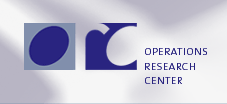ABSTRACT
Driven by technological advances, modern financial markets have become an electronic world dominated by automated agents that interact algorithmically. Markets are now characterized by decision-making that evolves on a microsecond timescale, with activity fragmented across many exchanges and alternative market structures. This has led to challenging new problems for market participants and policy makers. This talks explores some of the basic questions and develops quantitative models to address issues that have arisen in modern market microstructure.
First, we consider the issue of the economic value of queueing effects in electronic limit order books operating under a price-time priority rule. Here, amongst all resting orders awaiting trade at a given price, earlier orders are prioritized for matching with contra-side liquidity takers. In practice, this creates a technological arms race amongst high-frequency traders and other automated market participants to establish early (and thus advantageous) positions in the resulting FIFO queue. We develop a model for valuing orders based on their relative queue position. Our model identifies two important components of positional value. First, there is a static component that relates to the tradeoff at an instant of trade execution between earning a spread and incurring adverse selection costs, and incorporates the fact that adverse selection costs are increasing with queue position. Second, there is also a dynamic component, which captures the optionality associated with the future value that accrues by locking in given queue position. Our model offers predictions of queue position value as a function of market primitives, and can be empirically calibrated.
Second, we investigate the role of a large and growing class of alternative market structures known as electronic crossing networks or dark pools. Relative to traditional `lit' intermediated dealer markets, dark pools offer investors the trade-off of reduced transaction costs in exchange for greater uncertainty of trade. In an equilibrium setting, we analyze the choice between dark and lit venues, and illustrate how this critically depends on the information available to each investor. We establish that while dark pools attract relatively uninformed investors, they still experience adverse selection. Moreover, the informational segmentation created by a dark pool leads to greater transaction costs in lit markets. Ultimately, in our setting, we establish that the introduction of a dark pool reduces the overall social welfare.
Parts of this talk are joint work with Kai Yuan (Columbia), Ramesh Johari (Stanford), and Krishnamurthy Iyer (Cornell).


